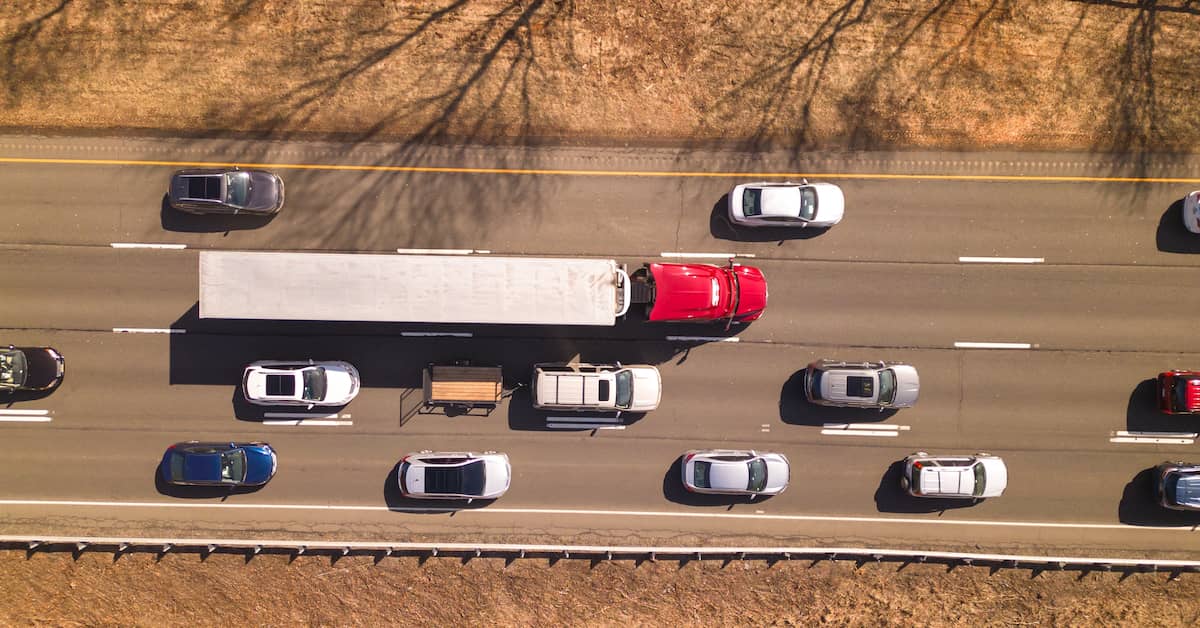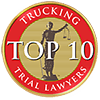
Truck accident cases tend to be highly complex, largely because of the amount of damage they cause. While the average passenger vehicle can weigh around 3,000 pounds, a fully loaded 18-wheeler can weigh up to 80,000 pounds. That’s 25 times heavier.
So, when something goes wrong and a truck collides with a passenger vehicle, the majority of the damage is done to the passenger vehicle and its occupants, often leading to devastating injuries. This means that, when it comes to pursuing compensation for the damages done, there can be a lot of money on the line – sometimes millions of dollars.
Insurance companies are not quick to pay out this kind of money in compensation, and they will do whatever they can to avoid responsibility.
If you or a loved one has been injured in a truck accident, this means that the deck is stacked against you. The legal acumen and experience of insurance attorneys can make it very difficult to navigate the legal system and receive fair compensation.
At Colombo Law, we want to help individuals affected by truck accidents gain a better understanding of how truck accident lawsuits work, including how liability is determined, how much to seek in compensation, and much more.
But first, if you are currently trying to figure out how you or a loved one can receive the compensation you need and deserve after a truck accident, don’t hesitate to reach out for a FREE case review with the attorneys at Colombo Law. We can review the details of your situation, help you understand your options, and provide some clarity about what to do next.
Determining Liability
“Liability” is the legal term for “responsibility.” That is, who was at fault for the accident?
Everything hinges on the answer to this question, and it will determine whether or not an individual is able to receive compensation for the damages they are facing as a result of the accident.
With truck accidents, this is often a complex question requiring a thorough investigation. There may be multiple parties involved, including the truck driver, the trucking company, a parts manufacturer, a mechanic or service center, and the company that loaded the truck – to name a few.
While your case may seem like a clear-cut case of driver negligence, it’s possible that this negligence was a result of the trucking company forcing its employees to drive longer hours than they are legally allowed. Similarly, the company may have failed to follow regulations around maintenance schedules.
In other words, compared to a car accident, there are many more applicable laws and regulations to understand in order to develop a clear picture of liability in a trucking case.
This is why we urge anyone involved in a truck accident to work with attorneys who have significant experience with truck accident lawsuits. Someone who handles car accident cases but isn’t as familiar with truck accidents likely won’t have the breadth of knowledge and experience needed to effectively represent truck accident victims.
Calculating Your Damages
While certain types of damages are relatively easy to calculate, such as immediate medical expenses and property damage, it’s important that you understand the full picture of what you can pursue in a truck accident lawsuit.
These damages include other expenses related to your medical treatment, such as ongoing therapy, as well as compensation for the pain and suffering you have endured as a result of the accident.
Having represented many truck accident victims, we have seen time and again how traumatizing and difficult dealing with a truck accident can be. Our lawyers never overlook the emotional and psychological impact of these accidents in determining the compensation to which you may be entitled.
Investigation & Gathering Evidence
Ultimately, winning a truck accident lawsuit comes down to the quality and quantity of the evidence you can gather. This can include everything from photos of the accident scene to accident reconstruction models.
With truck accidents, it’s also important that your attorneys do a full investigation of the driver and trucking company. This means reviewing the truck driver’s logs, their history of employment, and much more.
If, for example, the driver had a history of driving under the influence, the trucking company could be held partially responsible for hiring them in the first place. Additionally, if the motor carrier has violated state and federal regulations in the past, it is important to identify that pattern of behavior.
Filing Your Lawsuit
While there are times when it makes sense to accept a settlement out of court, it is of the utmost importance that your attorney is willing to file a lawsuit on your behalf if you cannot reach a satisfactory settlement. Trying your case in court can take longer and it can make things more complicated, but you should never accept a low-ball offer from an insurance company.
The good news: If you’re working with an experienced truck accident lawyer, they will handle all of the legal matters for you while you focus on getting better.
Settlement Negotiations
Once the lawsuit is filed, there will be other chances to settle the case before going to trial. Often, this will involve a mediator who works with you and your attorney and the insurance companies’ attorneys to try to reach a settlement agreement.
Again, settling can be preferable. You will receive compensation sooner and without having to go to trial. However, if the insurance company digs in its heels and refuses to pay a fair amount in compensation, your attorney must be willing to take the case to trial.
Trial (If Necessary)
Initiating a trial will start with your attorney filing a complaint with the court, after which a notification will be sent to the insurance company (or companies). The insurance company will then hire an attorney who will file an answer. The case will then proceed to the discovery phase, during which both sides will have a chance to request and review evidence to build their respective cases.
Your attorney will prepare the case on your behalf, working with experts such as medical professionals and accident reconstruction specialists. When the case goes to trial, a judge or jury will decide the outcome of the case. As such, your lawyer will make a strong argument for your right to maximum compensation.
Frequently Asked Questions
What Should You Do If You Get Hit by a Truck?
After getting hit by a truck, the first thing you should do is call the police—if you are able—and get the appropriate medical treatment for your injuries. Not only is this the best thing for your well-being, but it might also play an important factor in your truck accident claim.
If you refuse to seek medical treatment and later attempt to recover compensation for damages that resulted from your injuries, the insurance company may use your lack of medical treatment as a sign that your injuries were not serious—even if they turned out to be very serious.
Read More: How to Protect Your Rights After a Commercial Truck Accident
Collisions with semi-trucks usually result in serious injuries. You may need to be taken to the hospital immediately. However, if you can remain at the scene after being examined and released by paramedics, there are a few more things you should do after being hit by a truck. These include:
- Take photos and video of the truck, your vehicle, and the accident scene as a whole.
- Collect the contact information of anyone involved in the accident.
- Speak to any witnesses who saw the accident take place and get their contact information, too.
- Provide a statement to the police.
You should also reach out to a truck accident attorney as soon as possible so they can begin evaluating the cause of the accident, gather evidence, and ensure you are not taken advantage of by the insurance companies.
What Evidence Do I Need for a Truck Accident Lawsuit?
While there is no list of specific evidence you will need for a truck accident lawsuit, it is critical to understand that your case must be based on evidence that clearly demonstrates the negligence of another party. You must show that this negligence led to the accident, which directly resulted in your injuries and damages.
As such, evidence can take many forms. This includes:
- Photos of the accident scene
- Eyewitness testimony
- Medical records and other documentation related to the accident and your subsequent injuries
- Copies of any accident reports
- Photographs and expert assessment of the truck
Much of the evidence in a truck accident lawsuit can be difficult to obtain because it is held by the trucking company. The truck driver’s log, data from the truck’s black box, and other records are all crucial. They may prove that the truck driver was on the road too long prior to the accident, that the truck was not properly maintained, and much more.
Experienced truck accident attorneys understand the importance of this evidence. They will take steps immediately to secure the necessary records and hire experts to help determine who is at fault and what right you have to compensation.
Read More: Who Is Liable for a Truck Accident?
What Damages Are Available in a Truck Accident Claim?
Damages—which refer to losses suffered as a result of an accident—can take a few different forms:
- Economic damages are direct monetary losses caused by an accident, including:
- Medical bills
- Property damage
- Lost wages
- Modifications to one’s home or vehicle
- Therapy and rehabilitation
- And more
- Noneconomic damages are psychological or emotional in nature, intended to compensate an accident victim and/or their family for the pain, suffering, and trauma caused by an injury.
- Punitive damages are rare, but they are intended to punish defendants for losses suffered as a result of (a) “actual malice toward the plaintiff” or (b) “a conscious, reckless and outrageous indifference to the health, safety and welfare of others” (see West Virginia Code § 55-7-29). In addition to punishing defendants for serious wrongdoing, an award of punitive damages serves as a warning to others not to engage in similar conduct.
Each of these categories needs to be carefully reviewed and considered when calculating an appropriate settlement amount.
How Are Truck Accident Settlements Calculated?
Truck accident settlements are calculated by taking a close look at each of the types of compensable damages—economic, noneconomic, and punitive—and assigning a monetary value to each of them.
In the case of economic damages, you need to make sure to calculate not only past expenses, but also potential future costs. For example, if an injury is going to require long-term rehabilitation or home health care, those costs should also be calculated into the total settlement amount.
Noneconomic damages are more complicated to calculate since it is difficult to place a monetary value on pain and suffering. However, there are accepted multiplication methodologies, depending on the severity of your accident, that can help you come to the appropriate numbers.
Finally, punitive damages are decided by the court if your case goes to trial. The only specific rule is that they cannot equal more than (a) $500,000 or (b) four times the value of compensatory damages—whichever is greater.
Do I Need a Truck Accident Attorney to File a Lawsuit?
Technically, no one needs an attorney to file a lawsuit, just as no one needs a car mechanic to fix their car or a roofing company to replace their roof. The more important question is if you should hire a truck accident attorney to file your lawsuit.
For most people who do not regularly deal with the intricacies and complexities of truck accident litigation on a regular basis, the answer is probably yes—especially when you realize all that goes into building a successful case. This generally includes:
- Investigating the accident
- Gathering evidence
- Interviewing witnesses
- Calculating damages
- Negotiating with insurance companies
- Filing a lawsuit as needed
- Presenting your case in court (if necessary)
Further, a truck accident attorney can help you avoid mistakes that could harm your ability to recover maximum compensation. Insurance companies will do everything they can to twist your words and take advantage of your situation, which an attorney will be able to spot and help you avoid.
Will My Truck Accident Lawsuit Go to Court?
There is always the chance that a truck accident case will go to court, though it depends on several factors. These include the complexity and value of your claim, the insurance company’s willingness to pay you the appropriate amount for your damages, and your tolerance for uncertainty.
If, for example, the insurance company refuses to offer the full amount that you deserve, but they are willing to offer 80% of the damages, you may decide to take the settlement offer to avoid the time and uncertainty involved in taking your case to court.
Read More: How Long Does It Take to Settle a Semi Truck Accident Claim?
The important thing is that your attorney is there alongside you the whole way and is fully invested in fighting for your rights and best interests. If you decide not to go to court and instead accept a lower offer than you may deserve, it should never be because your attorney does not like going to court. It should also never be because you do not fully understand the ramifications of your decision.
Make sure you can trust your attorney at all times, especially when dealing with whether or not to settle or file a lawsuit and prepare your case for trial. At Colombo Law, we prepare every case as though it will go to trial. This strategy has enabled us to obtain millions of dollars in verdicts and settlements for clients injured in truck accidents.
View Our Results
Get in Touch with the Truck Accident Lawyer of Colombo Law
If you have been injured in a truck accident in Morgantown or elsewhere in West Virginia and you are trying to figure out what to do next, please contact Colombo Law online or by phone at (304) 599-4229 today. Your initial consultation is FREE and 100% confidential.










